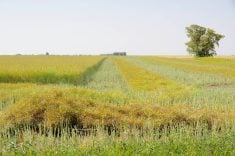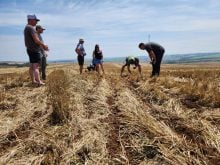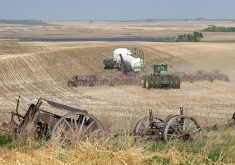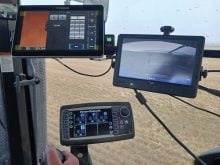Glacier FarmMedia – When Hallie Shoffner runs a trial on her Arkansas farm, she gets an equity stake in the startup whose product she’s testing.
She’s a member of AgLaunch, a non-profit focused on boosting agricultural technology development. The equity is part of her reward for participating in their farmer network.
“It has always bothered me that ag tech improves products using data from the farm, yet farms don’t get compensation for providing that data,” she said.
Shoffner runs a 2,000-acre seed farm growing 20 varieties of specialty rice, plus soybeans, corn and wheat. She was part of an AgLaunch panel at the World Agri-Tech Innovation Summit in San Francisco in March.
Read Also

Research looks to control flea beetles with RNAi
A Vancouver agri-tech company wants to give canola growers another weapon in the never-ending battle against flea beetles.
The summit drew both ag tech startups and established companies from around the world for two days of one-on-one meetings, networking and presentations. AgLaunch was one of many firms sponsoring a panel presentation.
AgLaunch president Pete Nelson spent his 20s on a small farm near Memphis, Tennessee. He got interested in adding value to local agriculture, rather than the status quo business model in his area, with producers shipping unprocessed corn and soybeans up and down the Mississippi River. From there, he decided to make a career of it.
He formed AgLaunch in 2016, with two farmers and an idea: to provide accelerator services to new ag tech startups and to co-operate with farmer members to field test these startup products.
Startups are rich in innovation but, as small independent companies, need investors to test their ideas, scale up production and, ideally, take their products commercial. Startups chosen to work with AgLaunch get on-farm evaluation of their innovations. Farmer members get equity in these new companies.
The vision, as written on the AgLaunch website, is to support business development, mentor diverse young talent and find new approaches to farming.
“We do this by supporting agtech companies, building new value chains and collaborating with an innovative group of farmers,” the site reads.
AgLaunch grew to eight farmers in 2018. It now counts 44 member producers ranging from crops to livestock to urban market gardens. Their farm participants spread over five regions: the Mississippi Delta, the southeastern U.S., the southern Plains, Midwest and Pacific Northwest.
“Our vision is to have hundreds of farmer members strategically located in key regions and that complement each others’ capabilities,” Nelson said.
Nelson hand-picked the first farmer members — he knew Shoffner’s parents. More recent members joined through word of mouth.
“What the farmers have in common is that each is likely to be doing new things. They’re viewed as forward-thinking,” Nelson said. “They also play well with others and are willing to sacrifice for each other.”
The challenge with getting too big, Nelson acknowledged, is keeping members aligned with each other and the vision.
Farmer members agree to participate in co-op activities, including committees and on-farm trials. They get points for each level of participation, and more points mean more equity in the co-op and its startup investments.
“It’s an interesting model,” Shoffner said. “Not one I’ve seen replicated anywhere else.”
AgLaunch has a partnership with Iowa-based Ag Ventures Alliance, which started as a farmer-led ethanol facility and now also funds value-added projects and early-stage ag tech. Ag Ventures Alliance manages the AgLaunch limited liability company, the division of the organization that makes the ag tech deals.
AgLaunch members connect with startups through the AgLaunch365 Accelerator program. The process starts with a yearly call for proposals from startup companies that have a new but not yet commercialized innovation. Shoffner is part of the selection committee, which means sitting in on various rounds of presentations from investment hopefuls and culling. Once they have the list down to 20 innovations, AgLaunch invites companies to Memphis for a four-day session to share and refine their innovations.
“We kick their tires and they kick ours,” Nelson said.
This year, for example, AgLaunch started with 60 proposals and winnowed it down to eight.
Over the next two years, those companies will improve the product and get business and entrepreneurial training through AgLaunch Accelerator.
The potential payoff for farm participation comes when it comes time for the co-op to “exit” a deal. Those are cases where either there is sale of equity to a larger company (often one of the mainstream equipment, fertilizer or life science companies) or sale of shares when the startup makes an initial public offering (IPO).
In the long term, AgLaunch anticipates a number of strong exits to deliver returns to their farmers, Nelson said, “while also building some great businesses that create jobs and help farmers with practical solutions.”
It’s a model that local producers might want to take note of.
Amy Delaquis, a research manager who runs the on-farm research trials with Manitoba Canola Growers, noted the number of Manitoba farmers who are already doing on-farm research with commodity groups, and have been doing that kind of work for a decade or more.
“They would be all over this type of model,” she said.
The final startup list for 2024 includes a few companies offering biologicals for soil health, plant nutrients or plant health. One Alberta startup, Wandering Shepherd, has a bolus device that inserts in the stomach of livestock to monitor the health and location of individual animals. Another, Gripp Ag, tracks farm activity and equipment through a simple QR code and mobile app.
In Arkansas, Shoffner will trial the Gripp Ag tool on her farm this year. “One of the hardest things for a farmer is managing equipment,” she said.
Agriculture has entered the age of the startup, she argued. There have been “a proliferation of startups” since she joined AgLaunch in 2019.
“That’s where ag tech is going.”
Most of those companies will fail. The statistics for startup failure are notoriously high.
That caution was also noted at the summit, where one panel member noted that people want to finally see success with the wave of new companies coming onto the scene.
Shoffner’s shares in the co-op have not made her any money yet, but they have “saved me money,” she said.
She pointed to a company called Rantizo, which uses drones to spray crops. Drones are particularly useful for spot spraying weeds in moist rice crops.
“I will be excited when we have our first exit and I see some real cash money,” she said.

















